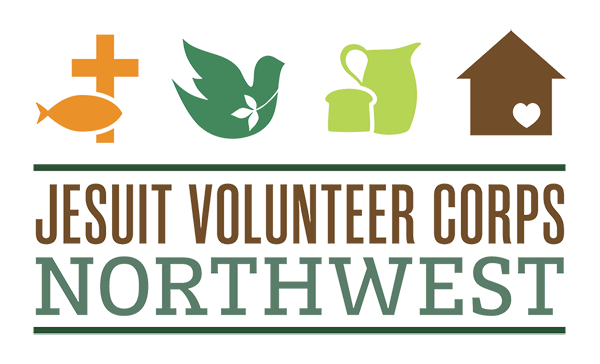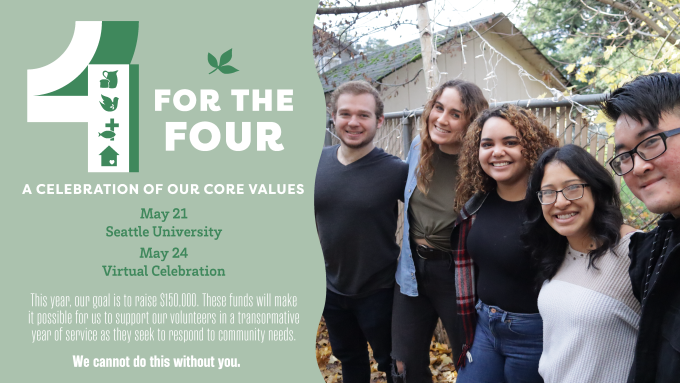For this month’s Featured FJV, we switched up the style and let former JV Anna Burnham (Portland, OR ’14-15, Former Staff) take the reins. She recently reunited with close friend and fellow FJV Rachel Young (Juneau, AK ’14-15) to ask her about her experience of the four core values as she travels across the Appalachian Trail. Enjoy!
Living the Four Values on an Appalachian Trail Thru-Hike
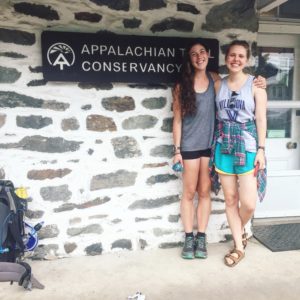
The Appalachian Trail is a 2,160 mile footpath that starts at the top of Springer Mountain in northern Georgia, winds along the backbone of the Appalachian Mountains in the South, passes through the fields and smaller mountains of the Mid-Atlantic before joining back up with the Green and White Mountains of Vermont and New Hampshire, finally terminating at the top of Mt. Katahdin in the wilderness of Maine. Every year, the myth and magic of the Trail attracts people from all over the world to explore its mountains, forests, fields, and hollows. Some folks come out for a day hike with the family, while others might be completing a section of the trail or a short overnight backpacking trip on the weekend, squeezing in outdoor rejuvenation whenever possible. However, every year there is a very particular group of people–young and old–who undertake the massive task of hiking the entire thing in one season. Most of these people start in the South and end up in New England, and by the time they reach Katahdin, they’ll have completed a deceptively simple but endlessly challenging and complex task: walking from Georgia to Maine. These adventruous folks are known as thru-hikers.
In May, I had the privilege of spending a few days on the Trail with my best friend and fellow FJV Rachel Young (Juneau, AK ’14-15)–known by her trail name Uke–who is completing a thru-hike this year. After several days of some of the hardest physical activity I’ve ever attempted (10 miles up and down ridges with a huge pack on your back is a lot harder than I anticipated, y’all), I talked to Rachel about being a thru-hiker and how she’s experienced each of the four values of JVC Northwest on the Trail (like the good former Recruiter I am!). I recorded our conversation over our camp dinner as a lightning storm was rolling in. [Rachel’s responses have been edited to cut out much of the weird, insular banter of best friends….]
Anna: Alright, let’s start at the top. Talk to me about community on the Trail.
Rachel: Oh, this is the easiest one. The Trail is one big community. Since it was first established [in 1937] and thru-hiking became a thing, it’s this space–both physical and theoretical–that people return to year after year. Once you’re a part of the community, you’re part of it forever. I’ve experienced community in so many ways out here–meeting people from all around the world who become your “trail family,” the people you walk with and camp with and spend your days with; there are the “trail angels,” who will offer rides into town for hikers or drop a cooler full of ice and cool drinks at a road crossing on a really hot day.
A: Even just spending a few days with you, I thought it was so cool how many people who knew you, even people you hadn’t run into for weeks and weeks.
R: Yeah, that’s the cool thing about being a NOBO (northbound) thru-hiker; you know that you’ll see people at different points, and they’ll ebb and flow in and out of your experience, but you’re all striving for the same thing and you’re all literally headed in the same direction. There’s a big saying, “See you down the Trail.”
A: And “hike your own hike,” right?
R: Absolutely. The community is so open and accepting to all different types of people and hikers–it’s about hiking the hike that’s right for you. It’s just a beautiful group of people to be a part of.
A: How about social and/or ecological justice?
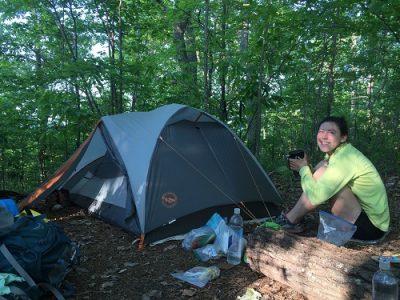
R: I think the practice most applicable to ecological justice is Leave No Trace (LNT). Basically, LNT means leaving a space–whether that’s the side of the trail or a campsite–the same way you found it. Thru-hikers pack our trash out with us and hold onto it until we get to town, we try to camp a certain distance from the Trail, and other practices.
The ecosystem of the Trail can only support so many people in terms of the water it provides, the space it provides, and what it can do for us, but we also have to think about how we can reciprocate in order to maintain that space and keep it as what it was intended to be: a preserved, natural, recreational place. It’s dual-purpose; keeping it nice for the person behind you and ensuring they have the same experience as you do, as well as protecting the animals and the forests that exist around you. You know, you leave food lying around, and suddenly there are bears rolling through the area, and that endangers both the bears and the people. It becomes a big safety issue for everyone.
Leave No Trace, and my experience living lightly on the Trail, is about sustainability, essentially. How do we sustain these recreational spaces, and keep them attainable for people, while also keeping them as wild as possible?
A: Alright, so we got two. Simple living seems…pretty self-explanatory. You have your life in a pack on your back.
R: Simplicity plays out in a lot of little ways. You have fewer things, you’re really stripped down to your most basic needs. You carry your food on your back, you sleep in a primitive shelter, you get water from streams. Your life just becomes…simple: get up, walk, eat, walk, eat, sleep, walk, eat, walk. Repeat.
A: It’s this incredibly simple yet incredibly complex goal, which is literally “just” to walk to the top of a mountain in Maine. But that’s made up of so many days and moments and choices to keep walking. And I don’t know…just kind of this weird faith that there actually is this mythical mountain in Maine.
R: Yup. A lot of times I’m thinking about nothing, and a lot of times I thinking about how I want to stop walking for the day. But even that can be an unexpected lesson, because being out here has made me realize how important it is to be in tune with my body. The people who make it to Maine aren’t necessarily the people who had the fanciest gear or hiked the most miles in a day; they’re the people who listened to their bodies and planned ahead.
A: In just a few days I’ve seen that what qualifies as a treat or indulgence is also redefined. Like you taught me, always eat the best thing currently in your food bag…
R:…because then you’re always eating the best thing in your food bag! Yup, it’s definitely the big JV idea: want vs. need. Sometimes I really want salami and cheese and tortillas with lunch, but I don’t always need them–it’s extra weight and I had enough food to get me here, you know?
A: Spirituality, talk to me.
R: I would say that a lot of spirituality for me comes with being really in tune with myself and my surroundings and feeling connected to myself and my surroundings. It comes when I have no other distractions, and I’m able to just think and experience and listen and look, and that’s pretty cool. And I also really enjoy challenging myself. And out here, I meet that goal every day.
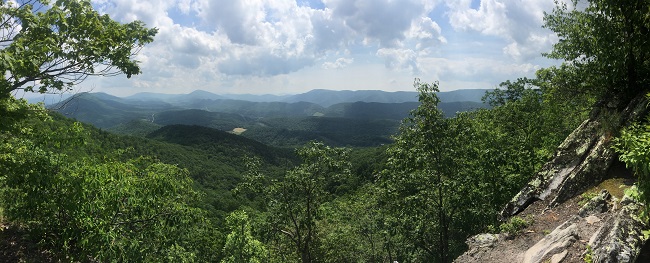
Is that tied to spirituality at all?
R: Sure, there’s that aspect of digging a little deeper. When you’re out here, you physically feel very, very, very small in the vast, expansive woods. There’s a lot of faith and trust in others that if you can’t make it, people will help you, or a trail angel will appear and help you when you really need it. People talk about “trail karma”—if you look out for others and the Trail, the Trail looks out for you, whether that’s through another person or through the actual Trail itself. It might be a person with extra water when you’ve run out, or a perfect rock to sit on for lunch when you just think you can’t walk anymore.
I’d say a lot of people are out on spiritual journeys of sorts, trying to figure out where they fit in. They know their passion is being in nature and being outdoors. There are people from all over, and we’ve all come here for different reasons. It’s a pretty special thing to be a part of.
Well, thanks for letting me awkwardly interview you while we eat dinner, and thanks for not making fun of me when I wanted to pass out on those climbs all week.
R: Oh, stop.
